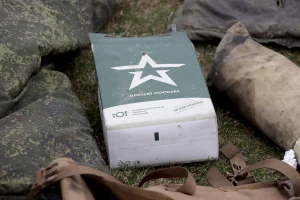
Prigozhin feels like master of Russia, will try to repeat coup - political expert Eidman
Russian sociologist, political expert and publicist Igor Eidman believes that when the Russian Federation's central government weakens, Prigozhin will try to repeat the rebellion with the help of Russia's security forces
He said this on the Espreso TV channel.
"It is still difficult to assess what has been taken away from Prigozhin and what remains with him. Prigozhin is a typical adventurer of the Civil War. Such people do not stop. When he felt powerful, he felt like the master of Russia. There is no doubt that he will want to do it again. I have no doubt that he will try to do so. But the tools will probably be different. Most likely, it will not be a massive march of his private army on Moscow, as this is not done twice," Eidman stressed.
According to the political expert, Prigozhin will try to stage a coup with the help of Russia's security forces.
"Most likely, there will be a conspiracy of people whom he bribed in the security forces over the years of owning Wagner PMC, when he participated in various Russian military operations. He bought different people. Surovikin is the tip of the iceberg, there are actually many such people. He will retain this resource, and when the central government weakens, perhaps after another military defeat, Prigozhin will try to repeat it. He has already had experience and will try to make a successful remake," Eidman suggested.
Prigozhin's rebellion in Russia
The conflict between Wagner PMC financier Yevgeny Prigozhin and the Russian Ministry of Defence continued for several months, but the situation escalated sharply on the evening of 23 June.
Allegedly, Russian troops launched a missile attack on the Wagner base. Yevgeny Prigozhin, the leader of the Wagner PMC, announced a "march of justice" and stated that 25,000 mercenaries were heading to Moscow after the Russian leadership refused to hand over Defense Minister Sergei Shoigu and Chief of the General Staff Valery Gerasimov.
On Saturday, June 24, in addition to Rostov-on-Don, where they initially gathered around the headquarters of the Southern Military District, the Wagner group also took control of Voronezh. Their convoys, which had diverted from the Ukrainian border, were moving towards Moscow. Military aircraft and artillery under Shoigu's control attempted to stop them. The units of Wagner PMC were last spotted in the Lipetsk region. In Moscow itself, defensive positions were established, trenches were dug, and all security forces were mobilized.
However, on the evening of June 24, the press service of the self-proclaimed President of Belarus, Alexander Lukashenko, released a statement in which the head of the Wagner PMC stated that he was ready to stop the advance of his mercenaries' military convoys, which were already approaching Moscow, and to reach an agreement with the Kremlin. Prigozhin allegedly agreed on this during a conversation with Lukashenko.
Instead, Prigozhin announced that the Wagner group had stopped their advance and returned to their field camps before reaching 200 km from Moscow. He stated, "In a day, we covered a long distance, stopping only 200 km away from Moscow. During this time, no blood was shed. However, the moment may come when blood will be spilled. Therefore, taking full responsibility, we are turning our columns around and heading back to the field camps as planned."
Subsequently, Prigozhin and all his fighters left the headquarters of Russia's Southern Military District. Russian leader Vladimir Putin promised that Prigozhin would be able to go to Belarus, and Russia would close the criminal case against him.
On June 26, Russian media reported that the leader of PMC Wagner remained under investigation in the case of organizing a coup in Russia, despite the Kremlin's statements about closing the case.
On the same day, Putin gave a speech in which he offered the Wagner PMC fighters three options for future actions: join the Russian Defense Forces, go to Belarus with other PMC members, or return to their families.
Meanwhile, Wagner leader, Yevgeny Prigozhin, said that the main goal of the mutiny was "to prevent the destruction of the Wagner PMC, not to overthrow the government" and called it a "march of justice." He also claimed that the offensive on Moscow had stopped because the mercenaries "did not want to shed much blood."
On June 27, the Federal Security Service of Russia announced the termination of a criminal case on armed rebellion involving the leader of Wagner PMC, Yevgeny Prigozhin.
The Russian Ministry of Defense claimed that Wagner mercenaries would hand over heavy equipment to the regular Russian army.
On the same day, the self-proclaimed president of Belarus confirmed Yevgeny Prigozhin arrived in the country. According to him, the Wagner fighters who arrived with him will not guard the Russian tactical nuclear weapons deployed there.
Read more on the events here.
- News














































